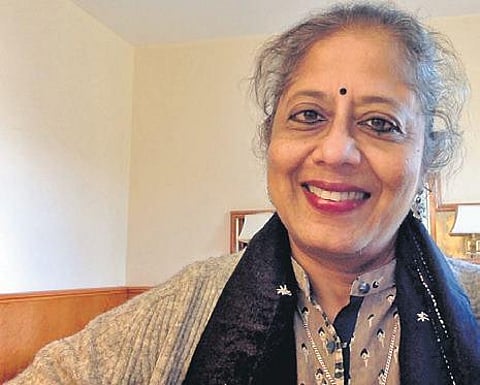

We have all known Mahatma Gandhi as the Father of the Nation, a lawyer, a social reformer, a leader and the messiah of non-violence who helped India achieve Independence. But have we ever thought the role music played in his life? Historian Lakshmi Subramanian, professor at the Humanities and Social Sciences department, BITS Pilani (Goa), throws light on the role of music in Gandhi’s life and his relationship with music and nationalism in her new book Singing Gandhi’s India . Excerpts from an interview:
When did the idea of penning a book on Gandhi and music come to you? The idea of writing on Gandhi and sonic nationalism emerged over time. I have in the past thought about and written on aural affinities and communities of listeners whose imagination was informed by both nationalism and the affective potential of music they heard. I did not specifically think of Gandhi until the commissioning editor at Roli Books approached me. I was initially reluctant but my curiosity piqued over time and I took up the project of reading about a man whose politics has always intrigued me.
Why do you think no one attempted writing about this subject till now? This has partly to do with the fact that music and the performing arts in South Asia has only emerged as an academic field in the last 15 years. Methodologically, the subject is challenging as we try and assemble an archive to study the phenomenon of listening and of capturing its effects on the construction of self-hood. With Gandhi’s bhajans, the tendency has been to treat them in an anodyne fashion without considering their production or contextualising their use in mobilising public consciousness.
What challenges did you face while writing Singing Gandhi’s India? The challenges were to do with the time frame I worked with and also the nagging dissatisfaction that I was consulting his writings in English for the most part. Roli Books have always had a keen sensibility in coming out with some of the most interesting titles, so working with them was really a smooth sail.
Did you come across any other side of Gandhi that impressed you? Nothing as such. What impressed me the most about Gandhi’s writing was his uncompromising commitment to communal harmony. This, I think, is absolutely critical in today’s times.
How much time did it take you to finish the book? I wrote this book quite quickly as I had a deadline of 18 months which I honoured. It was not easy though. If I was given some more time I would have expanded certain themes. However, what worked in my favour was what Gandhi wrote. He wrote in an eccentric and elaborate fashion — sometimes repeating himself, at others contradicting himself. This made his collection an exciting archive to mine.
How is this book relevant in today’s times? His absolute and uncompromising commitment to carry all communities together in crafting a utopian society is still relevant these days, especially as we live in cynical times when everything is about mobilising opinion for narrow gains and presenting one’s identity in the most superficial and orchestrated manner.
Any book that inspired you to take up writing? Shahid Amin’s book Event, Metaphor, Memory. Also, my stint at the Institute of Advanced Studies in Nantes where I spent some time writing this book was a source of deep inspiration. Working amidst cordial and discerning colleagues was a pleasure.
Is writing energising or exhausting? Both, when writing flows, it’s exhilarating, when it does not, it’s demoralising.